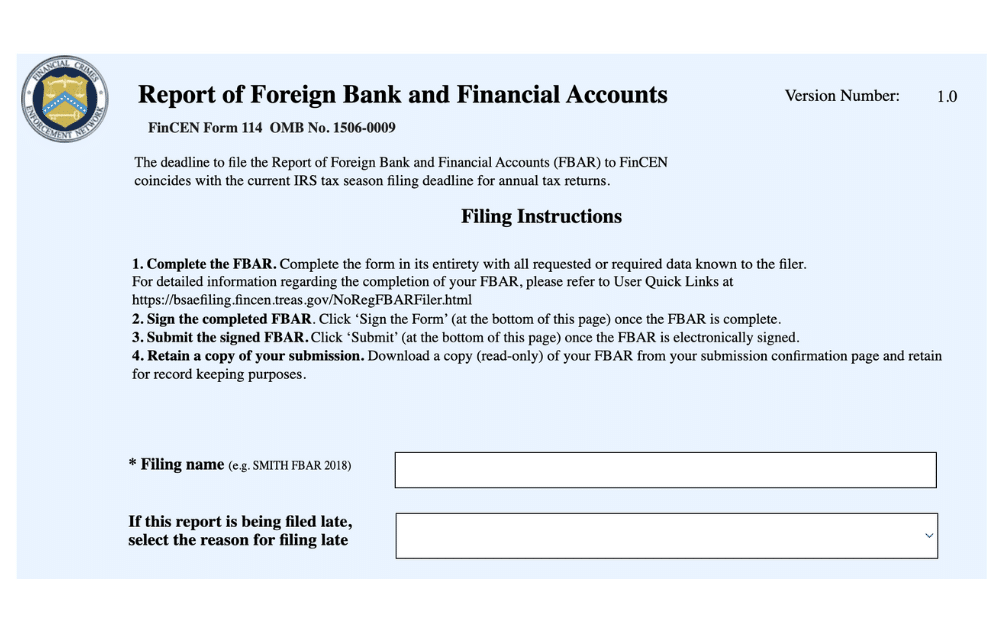FBAR: What It Is, Who Must File, & How To Report Foreign Accounts

- What Is the FBAR (Foreign Bank Account Report)?
- FBAR Reporting Requirements
- Who Needs to File an FBAR?
- How to File the FBAR
- FBAR Filing Deadline 2025 and Extensions
- FBAR Penalties for Non-Compliance
- What to Do If You Haven’t Filed an FBAR
- FBAR vs. FATCA: What’s the Difference?
- Common FBAR Misconceptions
- Filing FBAR Doesn't Have to be Complicated
You’re probably aware that US expats have unique tax and reporting requirements but may not be confident about the details. Don’t worry, you’re not alone. Greenback’s 2024 Expat survey revealed that, in order to comply with foreign and domestic regulations, 38% of US expats have changed the way they use financial products while living abroad.
In this article, our certified tax professionals will walk you through Foreign Bank Account Report (FBAR) requirements, FinCEN Form 114, 2025 deadlines, and penalties for misrepresenting foreign bank accounts.
Let’s get started.
Key Takeaways
- The FBAR reporting threshold is $10,000. Any US persons with foreign financial accounts that exceed that figure, in aggregate, at any time during the year must file. Use FinCEN Form 114 to do so.
- The FBAR is a reporting requirement, not a tax. You must file even if you have no income.
- The 2025 deadline is April 15, with an automatic extension to October 15. The due date is usually the same every year, but may be extended by a few days if these deadlines fall on a weekend or holiday
- Failure to file can lead to fines of up to $10,000 per violation.
What Is the FBAR (Foreign Bank Account Report)?
The FBAR is an annual reporting requirement, separate from your regular tax return, that prevents tax evasion by mandating disclosure of offshore assets. The Financial Crimes Enforcement Network (FinCEN) handles filing while the IRS administers penalties for non-compliance.
The FBAR is one of two reporting requirements related to foreign financial assets. If you meet the FBAR threshold, you may also meet the FATCA threshold. Read our guide here to learn if you’re required to submit a Form 8938.
FBAR Reporting Requirements
- Any US person (tax resident, citizen, resident alien, trust, estate, company, or other legal entity) with foreign accounts totaling $10,000 or more at any time during the year must file an FBAR.
- The requirement is triggered even if the balance exceeds the threshold for only a day (or even a minute)!
- Reportable financial accounts and assets include bank accounts, investment accounts, pension and retirement accounts, and certain insurance accounts with a cash surrender value.
- No taxable income? You still need to file.
Who Needs to File an FBAR?
FBAR applies to all US citizens, tax residents, resident aliens, or legal entities with foreign financial accounts in which they have a financial interest or signature authority.
- Financial interest refers to accounts you own or control, even if held under someone else’s name (e.g. a business partner, friend, or attorney).
- Signature authority means you can direct transactions in an account without owning it. For example, an elderly parent might add their child to a bank account so they can help with finances. Alternatively, employees may have signature authority on an employer’s bank account.
FBAR applies to total balances across multiple accounts. If you have $4,000 in a Canadian bank and $7,000 in a Mexican bank, you must report both accounts.
Lastly, spouses can file jointly if all accounts are shared.
How to File the FBAR
Submit FinCEN Form 114 through the BSA e-filing site. In addition to basic biographical information, you’ll need:
- Maximum yearly balances, converted to USD (using the US Treasury’s exchange rate for the final day of the calendar year) for all financial accounts
- Account numbers
- Financial institution names
The process is relatively straightforward once you’ve gathered the pertinent account information. However, if you’d like to be sure your expat taxes were done right, you can authorize Greenback or another third party to file on your behalf with FinCen Form 114a.
FBAR Filing Deadline 2025 and Extensions
The yearly FBAR deadline is April 15, with an automatic extension to October 15—no request needed.
Please note that the automatic extension doesn’t apply to your tax return. You must request an extension for that separately.
Dreading the last minute scramble pulling together your tax documents? Despair no more! This simple checklist lists the documents you need to have on hand when preparing to file.

FBAR Penalties for Non-Compliance
Failing to file can result in harsh penalties. The severity depends on intent. Did you willfully fail to file to avoid taxes? Or was the violation non-willful?
| Violation Type | Penalty |
| Non-Willful | Up to $10,000 per violation |
| Willful | Up to $100,000 or 50% of account balance per violation, and possible prison time. |
Notably, non-willful violations carry penalties that vary based on account balances at the time of violation. While each infraction carries a maximum fine of $10,000, the recent Bittner Supreme Court case capped a potential $2.72 million fine at $50,000.
What to Do If You Haven’t Filed an FBAR
First off, don’t panic! Millions of Americans have FBAR forms that are past due. The IRS created two amnesty programs to get you caught up, and both programs allow expats to comply with US law without paying penalties. Here’s a brief look at each.
Streamlined Compliance Procedures
This program is designed for taxpayers who didn’t know they had to file both income taxes and FBARs. Read our detailed guide on catching up on your taxes for more information, but in short, you qualify if:
- You self-certify that your failure to file was accidental
- File and pay your previous three years of income tax returns
- File the previous six years of FBARs
Delinquent FBAR Submission Procedures
This program is exclusively for catching up on FBARs. Use this procedure if you’re up to date on tax returns, haven’t kept up with reporting your financial assets, and haven’t been contacted by the IRS regarding this issue.
For detailed instructions, read our guide on filing late FBAR forms.
FBAR vs. FATCA: What’s the Difference?
Confusingly, the US government has a second place where you may be required to declare foreign financial assets: Form 8938. Created by the Foreign Account Tax Compliance Act (FATCA) in the wake of the 2008 financial crisis, this filing requirement also aims to crack down on tax evasion.
So what’s the difference?
From the government’s perspective, FATCA is easier to enforce. It requires foreign financial institutions to report information on US citizens directly to the IRS; there’s a third party involved, and they’re obligated to provide information to Uncle Sam.
From your perspective, it’s just another form, albeit with slightly different information requests and a higher filing threshold. You can read our FBAR vs Form 8938 guide for detailed information, but for now, here’s a breakdown of the most relevant distinctions:
| FBAR (FinCEN Form 114) | FATCA (Form 8938) | |
| Filing Threshold | $10,000 | $200,000 (single filer) $400,000 (married) |
| Who Has to File | Individuals and legal entities | Individuals only |
| Where to File | FinCEN (separate from tax return) | IRS (part of tax return) |
| What’s Included* | Foreign financial accounts* | Foreign financial assets* |
*This distinction may be confusing at first. You can hold an asset inside an account. In this case, it’s reportable on both forms. But if an asset is not held in an account, it’s only included on Form 8938. Examples include individually held stock or ownership interest in a private equity fund.
Common FBAR Misconceptions
There’s a lot of confusion about who needs to report their foreign accounts, and many people assume they’re off the hook for one reason or another. However, these myths can lead to serious penalties. Let’s clear things up.
“I don’t need to file if I don’t owe taxes”
FBAR has nothing to do with whether you owe taxes. It’s all about reporting, not tax liability. Even if you don’t owe a dime to the IRS, you’re still required to file an FBAR if you meet the threshold.
“My foreign bank reports my account for me”
While some banks do share information with the US, that doesn’t mean you’re off the hook. The responsibility to file an FBAR is on you, not the bank.
“Only large accounts need to be reported”
Many people assume that FBAR is only for the ultra-wealthy. Not true. The filing requirement kicks in if your total foreign account balances exceed $10,000 at any point during the year, even if that’s just for a moment
Filing FBAR Doesn’t Have to be Complicated
We hope this guide has helped you understand what the FBAR means for Americans living abroad. For general questions on expat taxes or working with Greenback, contact our Customer Champions.
If you’re ready to be matched with a Greenback accountant, click the get started button below or visit our FBAR filing services page.



